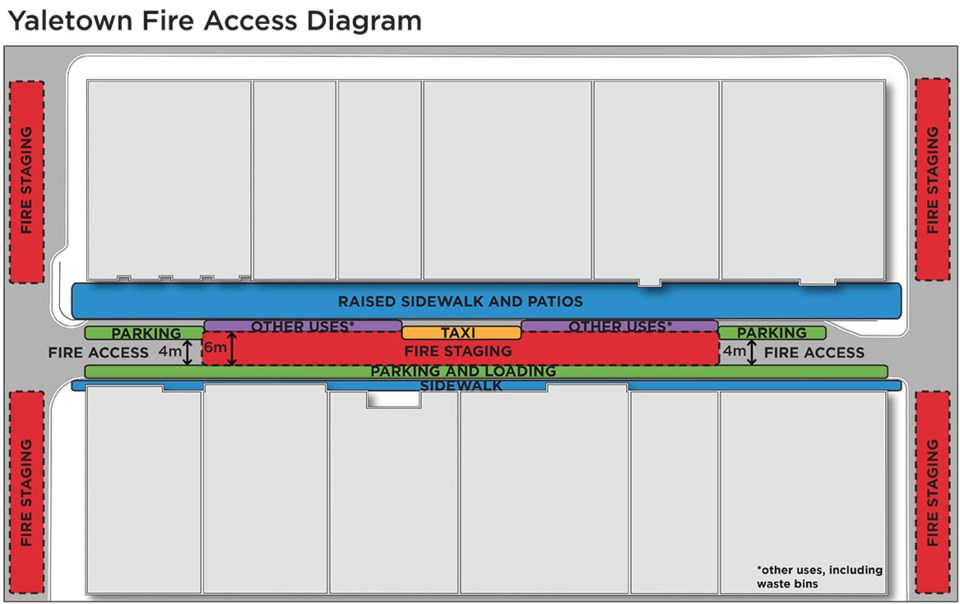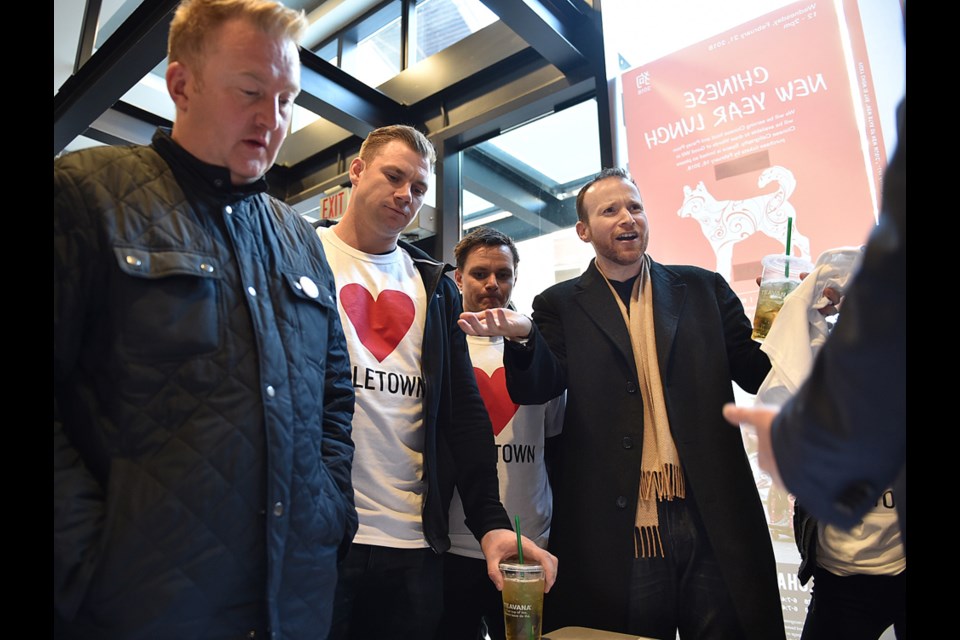The City of Vancouver says it is taking away 54 parking spaces from Yaletown’s commercial hub to make it easier for life-saving fire trucks to respond to emergency calls.
It also has a plan to add about 40 new spaces nearby.
Businesses along Hamilton and Mainland streets say the loss of parking puts their livelihoods at risk. No parking, no customers, no thriving neighbourhood.
The two sides got to talk to one another on Thursday afternoon during a public open house at the Roundhouse community centre. Whether either side will have a different point of view by the end of the day remains to be seen.
“It’s always possible there are options we didn’t look at,” Paul Storer, the city’s manager of transportation design told the Courier. “We really care about keeping Yaletown a vibrant shopping community but the life-safety issues are something we need to deal with.”
Jonathan Gormick, the public information officer for the fire department, says that Fire Hall 8 receives 500 to 600 calls in Yaletown a month. About 70 per cent of those calls are for medical emergencies, and the rule is that the closest available emergency vehicle responds. While the fire department does have a smaller medic unit, sometimes it’s not available and the larger trucks have to respond, he says.
Even if more medic units were added, as some people suggested at the open house, that still wouldn’t address the access issues for fire trucks should they be needed.
He did not have statistics available about how many fire calls there have been on the two streets.
Gormick says the fire department has been collecting information about the accessibility issue for the past two years. “It was just a matter of building up statistics” to determine that the problems weren’t just “one offs” or caused by inexperienced drivers. “We also looked at enhanced parking enforcement but it wasn’t producing lasting results…. The only [solution] that gets us the access we need is moving the parking.”

The city’s plan is to keep the parallel parking on the south side of each street. On the north side, it wants to remove some of parking spots in the middle to reserve them for emergency vehicles. The remaining spots would be switched from angle parking to parallel parking, making some available for taxis.
“I would be lighting my hair on fire,” says Neil Wyles, the former owner of Hamilton Street Grill who is still on the Yaletown BIA board of directors, of how he’d feel if he still owned a business there.
He says the city has taken a very “top down” approach to dealing with the issue by not consulting with the BIA before the parking changes were announced in January (and will become effective in March.)
“I feel it’s a bit heavy handed,” he told the Courier at the open house. It’s not just the parking that’s contributing to the situation. “The city is crushing businesses with overwhelming taxes and then is taking away parking for customers who will support those businesses.”
During the construction of the Canada Line at Davie and Mainland, Wyle says 40 to 50 businesses closed and their owners never returned. “It’s not the solution to crush businesses.”
“It’s very tough” to have a business in Yaletown, says Paul Rivas, a co-owner of The Parlour. “There’s higher rents, higher property taxes and also some of the highest metered parking.”
A lot of people are already discouraged from coming to the neighbourhood because of the difficulty finding parking. This will make it worse. As to the city’s lack of consultation, he says, “We’ve offered some good alternatives and they say, ‘We have a plan.’ Instead of working with us, they’re just dictating to us.”
“Without the parking it will very greatly affect foot traffic,” says Erik Heck, the chef at the Flying Pig, who added his voice to expressions of frustration over the lack of consultation. “Making a change that seems small is actually a massive thing….
“It’s such an amazing community that changing it without thought is a really, really negative thing. It would be a huge loss for the city to take away those spots and there are businesses that will suffer.”
“We are being bullied,” says Robbie Trudeau, who lives in the heritage district. For residents who don’t have parking in the same building where they live, it’s important to be able to park on the street, unload heavy or awkward items and then move their cars.
“It’s part of Vision Vancouver’s plan to turn Vancouver into a park,” says Andrew Pollard, who lives in the neighbourhood. “Rather than losing $2 million a year in parking why not bring in smaller fire trucks?”
He says that the fire truck issue is “a smoke screen.”
The problems started, Pollard says, when the city forced drivers to back into the angled parking spots to make it easier for tow trucks to access them. Vehicles jut out more onto the narrow street.
The city’s transportation manager says making the change from nose-in parking was important for safety reasons. Because of the one-way streets, tow trucks would have to drive the wrong way to remove a car; as well, there’s more visibility when you drive directly out of a spot, Storer says.



